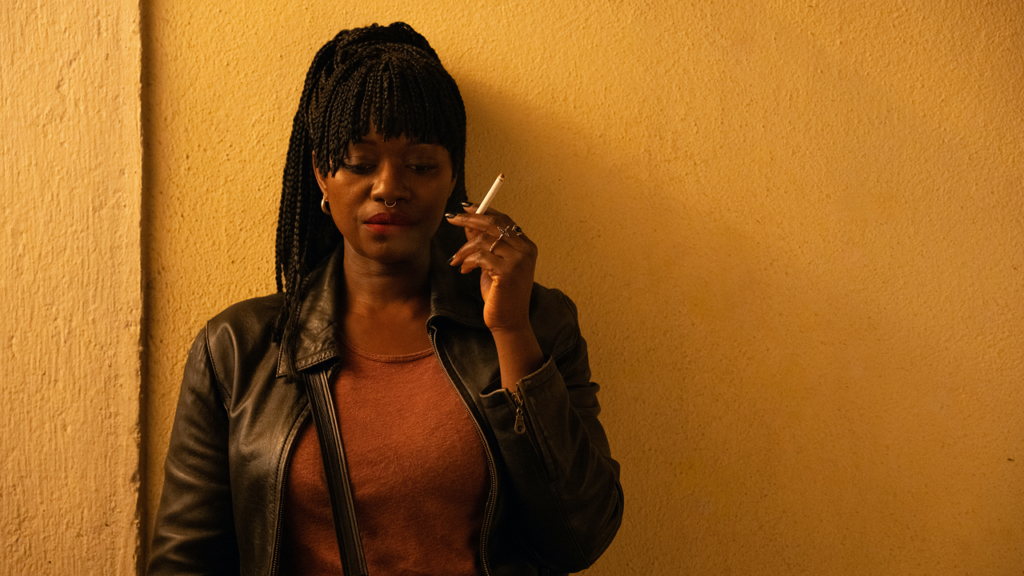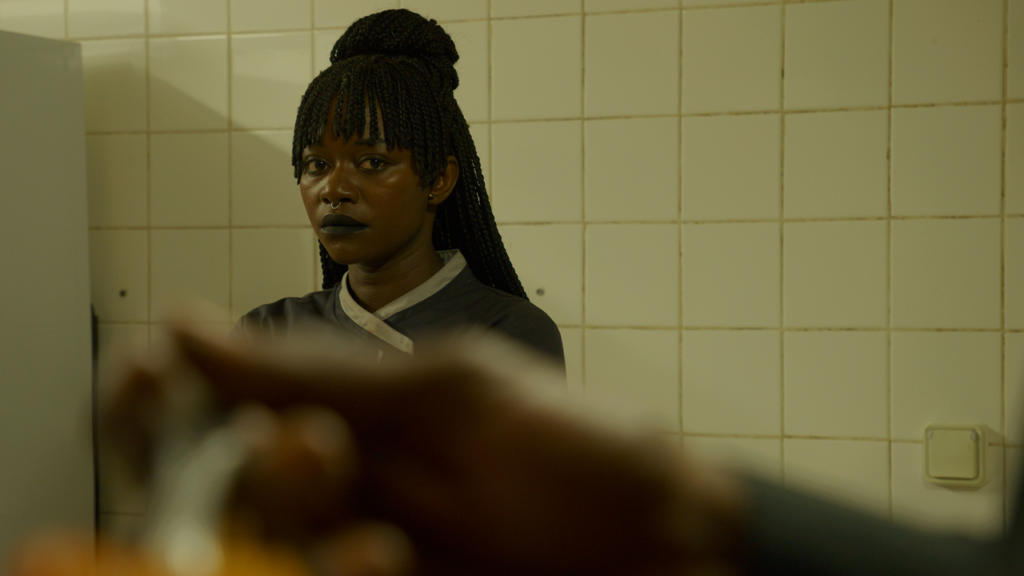Our Father, the Devil premiered at the 2021 Venice International Film Festival – making Ellie Foumbi the second Black female director to be selected in its history – and was an Official Selection of the 2022 Tribeca Film Festival. Stunning performances against neo-noir backdrops set the scene for shadowy characters, gripping twists, and a denouement that confounds generic expectations.
Ellie Foumbi’s debut is a psychological tour de force blending elements of thriller, melodrama, and horror with a metanarrative centered on the visceral afterlives of trauma. Following on from Atlantiques (Diop, 2019), Our House (Weekes, 2020), and Us (Peele, 2019), Our Father, the Devil explores the re-emergence of the past in the present and the liberation of suppressed identities. Presenting issues of migration, war, and relationships through a decolonial, womanist lens, Foumbi offers a fresh perspective on well-worn tropes and produces, in Marie, a brooding anti-hero who defies categorization. Babetido Sadjo’s powerful performance shapes every scene, placing the outsider’s gaze at the centre of events. She is engaging, funny, confident, and vulnerable, her irreducible complexity conveyed through the visual leitmotif of her refracted mirror images.
Marie enjoys solitude and a life of quiet routine. Working as a chef in a retirement home brings few challenges aside from the daily microaggressions, economic precarity, and threats of gendered violence that come with being a woman of colour in small-town France. It is this darkness underlying Marie’s subdued existence which Our Father, the Devil renders in its claustrophobic aesthetic, where chiaroscuro lighting and partially obfuscated shots of alleys, car parks, and walkways externalize a sense of being constantly surveilled and stalked. Initially contrasted with the relative respite of work and the open spaces of the countryside (a resident leaves Marie a cabin in the mountains), the film’s tone shifts as the scars of the past begin to bleed across the borders of her hitherto carefully compartmentalized life.
When a charismatic new priest comes to town, his voice marks him out as the warlord who killed Marie’s family in Kinshasa and made her a child soldier. As with Marie, Father Patrick (Souleymane Sy Savané) is introduced to spectators in fragmentary glimpses. Turning to rape-revenge horror, the use of subjective storytelling makes viewers complicit in the uncomfortably psychosexual pleasure she takes in vengeance and results in a flattening of peripheral – particularly male – characters who hold limited interest in her. With the cabin now recontextualized as a prison, they engage in a power struggle that threatens to defeat them both – though a fantastical corporeal resilience deflates the repugnance of these scenes. Complicating the political valence of victimhood, the film’s blurring of victim and victor is evocative of The Crying Game (Jordan, 1992), with its exposition of the asymmetrical power relations which structure minoritized lives as well as the channels of resistance open to them. The range of actors’ ethnic backgrounds, communicated via various cultural markers, enhances pan-African identification while intensifying the spectators’ disorientation. As Our Father, The Devil becomes more specific about the atrocities in which they have participated and suffered, it engages with broader issues concerning the complexity of trauma and its afterlives.

Understanding trauma requires us to move beyond a positivistic focus on discrete, temporary, closed-off events and instead probe patterns of crisis and change from a longer historical perspective. Our Father, the Devil is informed by narratives from the Rwandan genocide, through which Foumbi came to explore how survivors process trauma and forge new lives, often through the mechanism of migration. Given her own family’s journey from Cameroon to the US, the writer-director has a personal understanding of the impact of displacement, loss, and anonymity accompanying this movement, challenges so rarely communicated in mainstream narratives which almost exclusively cast migration in terms of opportunity. There are no flashbacks in Our Father, the Devil but the sounds of distant cries are shot through the score, echoing their indelible mark on the protagonist’s subconscious. The silence through which Marie conducts her relationships is an externalization of the inarticulable void caused by this profound and debilitating suffering. Fragmentary memories of rape and murder express pain without vicarious traumatization, refusing what cultural theorists E. Ann Kaplan and Ban Wang describe as “the act of ‘thinning’ down the ‘thick’ traumas of heterogeneous histories… in… Hollywood sensationalism” (2004: 11), so often heightened in depictions of Black suffering.
Grappling with collective memory and the violence of our national histories, Our Father, the Devil engages with institutional discrimination through its depiction of white authority figures who retain a colonialist view of the retirement home’s predominately non-white staff. Marie’s boss refuses her much-needed leave and blames her overworked employees for slipping standards. Turning off a radio transmission of a football match with Paris St Germain – a happy distraction from repetitive tasks – she tries to impose a kind of cultural guard duty on the kitchen. As chef, Marie asserts her position, nevertheless waiting for her to leave before turning the radio back on just in time for them to joyously celebrate Mbappé’s goal.

Intergenerational discussions between women address the role that sex, misogyny, fertility, and motherhood play in their romantic and familial relationships with men. The silences that attend these relationships, illustrated by Marie’s frustrated flirtations with Arnaud (Franck Saurel), express women’s marginalization through personalized interactions, the very site at which social and political forces play out. Ultimately, it is a womanist bond that provides the unconditional love Marie unwittingly seeks, through the unwavering (and at times comically annoying) loyalty of co-worker and best friend Nadia (Jennifer Tchiakpe).
Marie’s emotional remove enables a closer identification with the subject, presenting the viewer with a cognitive distance that allows us to be both moved and intellectually engaged. Her consistent framing by windows and doors – signifiers of margins and borders – puts us at a further remove which interrupts the narcissistic compulsion to reflect on our own suffering by identifying as the tragic other. Foumbi’s intersectional drama thus resists the supposed closure of meaning in the representation of trauma, as well as the cathartic aestheticization of politics whereby complex global histories become fetishized, commodified, and reduced. Dialectically then, working through trauma in Our Father, the Devil there is an insistence not on freeing oneself from trauma or one’s complicity in it, but on engaging with the messiness of conjunctural and contextual ambiguities.
Trauma is often referred to as the limit of representation. Moving away from expository, redemptive moments popular in films about Congolese refugees in Europe (as in The Front Line, Gleeson, 2006, where a priest saves a woman and child from war in the DRC and then from criminals in Ireland, ultimately sacrificing himself for a greater good), Our Father, the Devil is full of gaps and elisions which pertain to the incompleteness of memory, of rehabilitation, of interpersonal understanding and reconciliation. As the camera looks out across the mountains, capturing two characters in silhouette, our gaze is redirected from the many questions left unanswered to the slow death of structural inequality, the potentialities of hope, freedom of movement, and the cyclicality of violence. The final tableau reiterates the film’s African womanist gaze, leaving us to reflect on alliances between men and women, relational ethical frameworks, ancestral communal bonds, and the positive power of difference.
Dr. Zélie Asava is a Screen Studies academic. She is the author of Mixed Race Cinemas: Multiracial Dynamics in America and France and The Black Irish Onscreen: Representing Black and Mixed-Race Identities on Irish Film and Television, and co-editor of a special issue of the Journal of Scandinavian Cinema.

Pingback: OUR FATHER, THE DEVIL: Eight (8) Reasons to See Ellie Foumbi's Auspicious Feature Debut - Akoroko